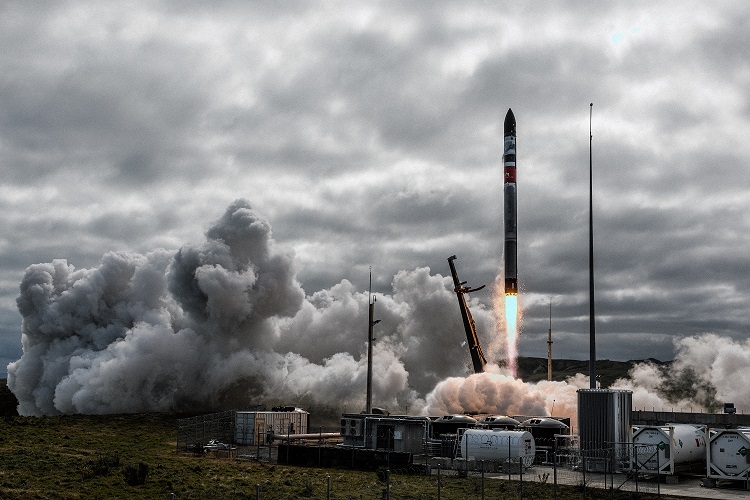

Rocket Lab’s 40th Electron mission, “We Love The Nightlife”, lifted-off from New Zealand’s Mahia Peninsula on August 24th at 11:45 am NZST (August 23rd at 7:45pm EST). (Credit: Rocket Lab)
Private space company, Rocket Lab, launched its 40th Electron mission on their lauded Electron rocket, dubbed “We Love The Nightlife”, on August 24th at 11:45am New Zealand Standard Time (August 23rd at 7:45pm EST), which also marks the 7th launch of 2023, all successful. The purpose of the mission was to deliver the next-generation Acadia satellite for Capella Space to a circular orbit above the Earth at 640 km (400 miles), which was executed flawlessly. Acadia is part of Capella’s synthetic aperture radar (SAR) constellation and is the first of four Acadia satellites that Rocket is currently contracted to launch for Capella.
“We’ve been a trusted launch partner to Capella since 2020 and we’re delighted to deliver mission success once again,” Rocket Lab CEO and Founder, Peter Beck, said in an official statement. “Electron has played a crucial role in helping constellation operators like Capella deploy their spacecraft on time and on target, and we look forward to continuing building out Capella’s constellation with more dedicated launches this year.”
After the successful launch, Rocket Lab crews successfully recovered the Electron first stage booster from the Pacific Ocean once it parachuted down upon stage separation. This marked the sixth time Rocket lab successfully recovered a booster from the ocean, and the third successful recovery in 2023. Rocket Lab has only attempted booster recoveries a handful of times, but this looks to be increasing since they’ve had three booster recoveries out of three attempts this year. The goal of booster recoveries is to enhance rocket reusability with the goal of decreasing launch costs.
Along with increasing reusability of the Electron rocket, this latest mission also marked the first time Rocket Lab attempted to reuse one of its 3D-printed Rutherford engines, which performed flawlessly with the rest of Electron’s nine first stage Rutherford engines. Rocket Lab posted an image of the nine engines prior to launch on their X account (previously known as Twitter), with the reused engine standing out from the rest due to its darker color.
Previous Rocket Lab launches for Capella Space include the “I Can’t Believe It’s Not Optical” mission in August 2020 that delivered a Sequoia Earth-imaging satellite to a 500-km (310-mile) low Earth orbit, and the “Stronger Together” mission in March 2023 that delivered the Capella 9 and Capella 10 satellites to a 600-km (375-mile) low Earth orbit. As noted, this latest mission was the first of four Acadia satellite launches, with the remaining three missions scheduled for launch by the end of 2023.
Founded in New Zealand in 2006, Rocket Lab’s goal is to deliver payloads to space with low-cost launch vehicles, which follows in the footsteps of private space company, SpaceX, founded in 2002. To accomplish this, Rocket Lab built the expendable, and now partially reusable, Electron rocket, with its first successful launch occurring in January 2018 after a failed first launch attempt in May 2017. All of their launches occurred in New Zealand until January 2023 when Rocket Lab conducted their first launch from American soil at NASA’s Wallops Flight Facility in Virginia.
This latest launch not only marks the 40th Electron, but also continues a streak of 20 successful missions, including one suborbital launch, with the last launch failure occurring in May 2021. Going forward, Rocket Lab has a full plate of contracted launches through the rest of 2023 and 2024 with several customers, both returning and new. The private rocket company is even slated to launch the first private mission to Venus sometime in 2025.
As this latest launch demonstrates, Electron has proven to be both a successful and reliable launch vehicle for Rocket Lab. However, Peter Beck’s private rocket company is currently working on the upgraded, and fully-reusable, Neutron rocket capable of listing up to 15,000 kilograms (33,000 pounds) to low Earth orbit depending on the launch configuration. For context, Electron can only launch a maximum 300 kilograms (660 pounds) to low Earth orbit and is only partially-reusable, as previously noted. Like Electron, Neutron will use nine first stage engines but called Archimedes, and they’ll be capable of much greater lift-off thrust. Neutron is currently in development and is slated to have its maiden launch sometime in 2024.
As always, keep doing science & keep looking up!
If you were Captain of the first USS Enterprise, where would you go!? Humanity is…
Now is the best time to observe Mars in 2025. Mars from 2014. Credit: Paul…
Scheduled for launch in 2027, the Nancy Grace Roman Telescope is slowly being readied for…
Few places in the solar system are better suited to a balloon than Titan. The…
We reported before about a NIAC-funded project known as the Lofted Environment and Atmospheric Venues…
The InSight Lander arrived on Mars in 2018 to study the planet's interior. Its mission…